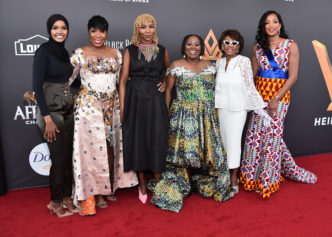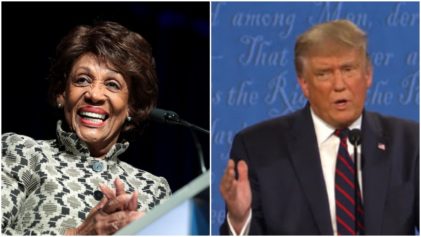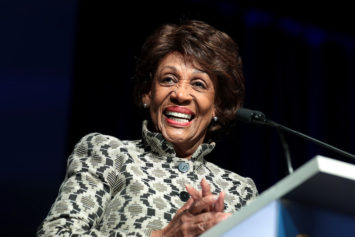Earlier this week, Fox News host Bill O’Reilly was asked to comment on substantive remarks by Congresswoman Maxine Waters. He chose to use the opportunity to insult her appearance. Later the same day, White House Press Secretary Sean Spicer was dismissive of longtime White House correspondent April Ryan, also a Black woman, telling her “stop shaking your head.” The two incidents are just the latest examples of the disrespect that many Black women face while simply doing their jobs.
Educator, activist and writer Brittany Packnett immediately understood the wider context of the stories. “It was important that people recognize that what happened to April Ryan and Congresswoman Waters [on Tuesday] is not a rarity,” she said during an NPR interview. Packnett took to Twitter and encouraged Black women to share examples of indignities in the workplace using the hashtag #BlackWomenAtWork. What followed has been eye opening for some and simply an affirmation for others. For some Black women, it’s a daily battle to be seen as anything other than “the help.” For example:
Arrive to keynote. White faculty ask me to go get them some water. I get it. Then tell them why I’m really there. #BlackWomenAtWork
— Traci Blackmon (@pastortraci) March 29, 2017
In reality, the examples above are very similar to Donald Trump’s treatment of April Ryan at a February press conference where he asked Ryan to set up a meeting with the Congressional Black Caucus. Instead of giving Ryan the respect of a senior White House correspondent, he treated her like his receptionist who, of course, knows every Black person and, therefore, is the logical person to set up a meeting between the president and Congressional members.
Other common themes running through the hashtag campaign include:
- Black women having to report to (and sometimes train) supervisors with less education and work experience;
- Black women having their recommendations or feedback ignored until repeated by a white or male colleague;
- Black women being told that they are somehow intimidating their white colleagues (even when, as one poster mentioned, she is all of 4’ 11”); and of course
- Black women being criticized for a variety of “unprofessional” hairstyles (or conversely being microagressively complimented when sporting more “traditional” hairstyles)
To add insult to injury, not only do Black women face these ridiculous behaviors and hostile environments, they do so while receiving a fraction of the pay that others receive in the workforce, even when those others have less experience. During last year’s presidential campaign, there was occasional discussion of the gender pay gap; overall, women who work yearlong full-time jobs earn roughly 79 percent of what men earn. However, Black women face the double burden of both a gender gap and a race gap. Thus, pay for Black women not only lags behind men but behind white women as well. Black women earn roughly 80 percent of what white women earn.
A recent fact sheet developed by the National Partnership for Women and Families, based on U.S. Census data, highlights some disturbing trends. Black women in the U.S. who work full time, year round are typically paid just 63 cents for every dollar paid to white, non-Hispanic men. As bad as that is, the gap in specific states is even worse, particularly in the South. In Mississippi, Alabama and South Carolina, a Black woman is paid between 56 to 57 cents for every dollar a white man is paid, while in Louisiana the rate is at 48 cents.
Ponder that for a moment. There is a state in this country where a Black woman who works all year full time is likely to earn less than half what the average white man is paid.
While some are quick to rationalize these gaps by assuming Black women are less educated, there is plenty of research that shows these gaps are maintained at every education level. A report by the National Women’s Law Center shows that, “African American women with a bachelor’s degree or higher typically make $50,559, about what white, non-Hispanic men who have some college but lack a degree make ($50,571).” Education simply is not the “great equalizer” when it comes to the lack of value placed on Black women.
In theory, Black women should be able to find relief from hostile environments and salary discrimination through the legal system. Indeed, on the same day that O’Reilly and Spicer were taking turns demonstrating the intersection of racism and sexism, two Black female employees at Fox News filed a racial discrimination lawsuit against the network. The lawsuit outlines various examples of racial harassment, including … wait for it … racist comments about a Black woman’s hair.
Unfortunately, such lawsuits have become increasingly difficult to win. Before reaching court, such charges are often investigated by the Equal Employment Opportunity Commission, an agency that was first thrust into the spotlight nearly 30 years ago when its former chair, Clarence Thomas, was himself accused of sexually harassing Anita Hill. Unfortunately, there was no #BlackWomenAtWork in 1991.
But, even under a supposedly more supportive administration, race and gender discrimination is still hard to prove. In 2016, the EEOC received 32,309 charges alleging race-based discrimination but dismissed 71.4 percent of them due to a lack of reasonable cause (i.e., insufficient evidence).
Charges of Equal Pay Act violations are much less frequent, primarily due to the difficulty women have finding out that they are receiving lower pay. However, when filed, such charges usually meet the same fate as race discrimination charges. In 2016, 64.3 percent of gender-based pay discrimination charges were dismissed due to a lack of reasonable cause. Again, whichever way a Black woman pursues justice in the workplace, the odds simply are not in her favor.
The hashtag #BlackLivesMatter launched a movement because it was easy to see the deadly consequences of excessive force by police, but other communities across the nation refused to accept it. The disrespect and discrimination faced by Black women in the workplace is just as pervasive and systemic and, much like killings by law enforcement, it’s a malady as old as the United States itself. However, it remains to be seen if #BlackWomenAtWork will spark a similar movement. And if so, will Black men who have been quick to defend “Auntie” Maxine and April Ryan, be equally passionate about the broader issue?


